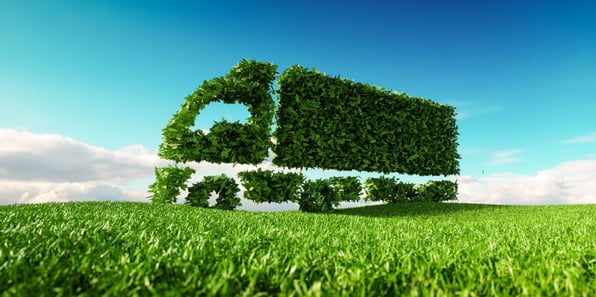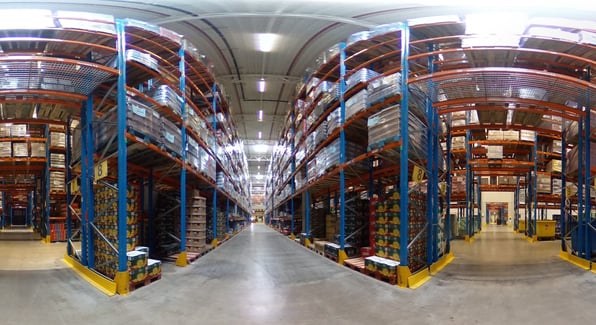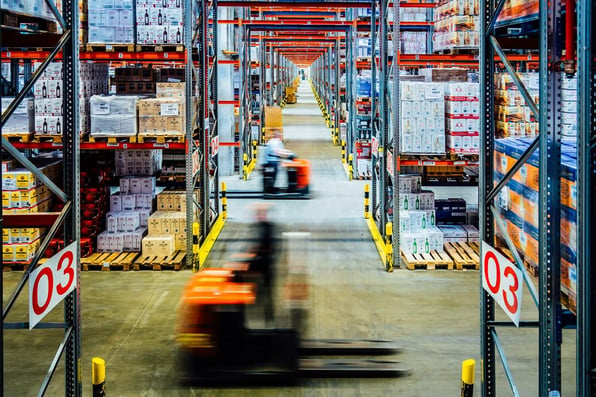2 min read
With 43,000 photovoltaic modules and a capacity of 18 MWp, Goodman is currently implementing the largest rooftop solar installation in Germany on the roof of the Marl logistics site operated by METRO LOGISTICS. With its total area of approximately 235,000 sqm, our multi-user warehouse Marl is a logistics center of superlatives and was one of the largest retail logistics centers in Europe at the time of commissioning in 2017. Now Goodman, as the owner of the property, and Baywa r.e., as the renewable energy developer, have begun installing the largest rooftop photovoltaic systems on a commercial property in Germany on the roof of the METRO LOGISTICS Marl site.
Own electricity demand covered
By the end of the year, 43,000 photovoltaic modules and around 140 inverters are to be installed on the roofs of the two building sections, which have an area roughly equivalent to that of 14 soccer fields. It is planned that the total output of the photovoltaic system will be 18 MWp, once 6 MWp and once12 MWp - the latter alone will currently be the largest rooftop photovoltaic system in Germany. METRO LOGISTICS will preferentially purchase solar power for its own needs, the surplus electricity will be fed into the power grid.
"We are pleased to use this area for the expansion of renewable energy, as this is an essential building block in making METRO LOGISTICS more sustainable. Depending on the sun's output, we will be able to cover all of our own electricity needs on almost all days via the solar power generated on the roof. We are also currently planning to equip our other logistics sites with photovoltaic systems," explains Christian Fieger, Head of Central Logistics at METRO LOGISTICS.
The photovoltaic system in Marl will play a significant role in reducing METRO LOGISTICS' CO2 emissions. For every kWh of electricity generated, 382 g of CO2 can be saved. Calculated over the year, this means that a total of around 1,100 t of CO2 can be saved. "In addition, our energy management approach allows us to contribute to reducing the CO2 footprint of our logistics customers at the Marl site," says Peter Kaleck, Operations Manager Marl.
Our contribution to more sustainability
At METRO LOGISTICS, we focus on sustainable business processes - because we act today for tomorrow. We see ourselves as part of society, which includes reconciling economic, ecological and social goals. That's why we invest in sustainable infrastructure, develop efficient processes that are as environmentally friendly as possible, and use our own modern fleet of vehicles. In this way, we help minimize the ecological footprint of METRO LOGISTICS and create longer-term value retention.
Specific measures at the Marl site
- To cool the temperature-controlled storage areas, the multi-user warehouse in Marl obtains cold brine from the neighboring EVONIK chemical park. This made it possible to dispense with in-house refrigeration systems that use ammonia as a refrigerant.
- All industrial trucks used indoors at the Marl site are electrically powered. In the future, it will be possible to use electricity generated from solar energy to recharge the batteries of our fleet.
- We rely on rail for handling containers: Our Marl multi-user warehouse is connected to the Rhine-Ruhr Terminal in Duisburg, and containers reach our logistics center from the Port of Duisburg in less than an hour. This combined freight transport not only reduces the carbon footprint, it is also an efficient alternative to transport by truck in times of contested freight space and congested highways.
- In our own fleet, we use vehicles of the best EURO 6 emission class as well as natural gas tractor units. Our climate-friendly gas trucks save around 25 percent CO2 compared to a conventional diesel truck.
- The site commissioned in 2017 was awarded the "Gold" seal of approval by the German Sustainable Building Council.
- In addition, energy-saving LED lighting is standard not only in Marl, but in all our warehouse locations. In the shelf aisles, motion detectors ensure additional savings.
- The rainwater that accumulates on the sealed surfaces is discharged into the Lippe river after being pretreated on the company's own property.
Picture Credits: Copyright by Goodman Germany GmbH



